Fill Out a Valid Nj Pro Vice Template
When navigating the complexities of seeking legal representation in New Jersey, attorneys who are not licensed to practice in the state but wish to represent a client there for a specific case must familiarize themselves with the NJ Pro Hac Vice form. This crucial document serves as a gateway for out-of-state lawyers to participate in New Jersey legal proceedings, under specific circumstances and with the court's approval. It outlines the procedural requirements and critical guidelines that must be adhered to, ensuring that the legal representation provided meets the state's standards. Submission of the NJ Pro Hac Vice form initiates a review process by the judiciary, examining the qualifications and background of the attorney in question to protect the interests of the client and the integrity of the legal system. Detailing fees, sponsorship by a local attorney, and other relevant details, the form presents an organized method for out-of-state attorneys to contribute their expertise where it is most needed, while maintaining the professional and ethical standards expected by New Jersey courts.
Sample - Nj Pro Vice Form
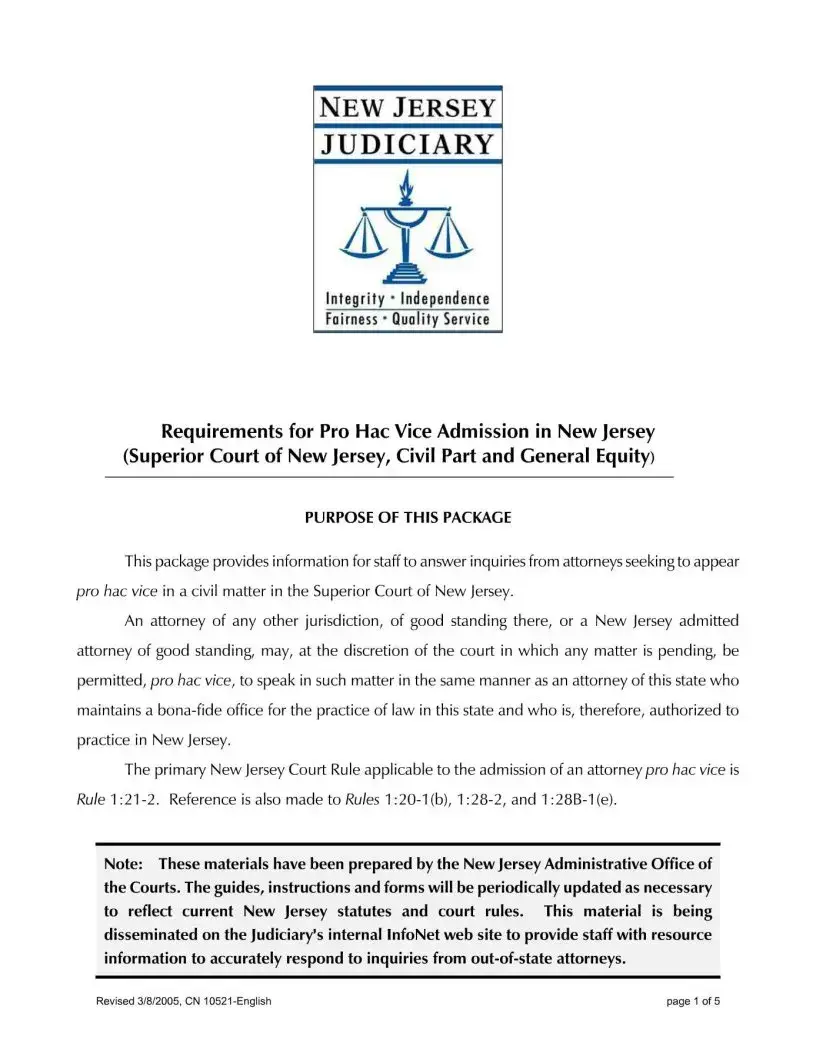
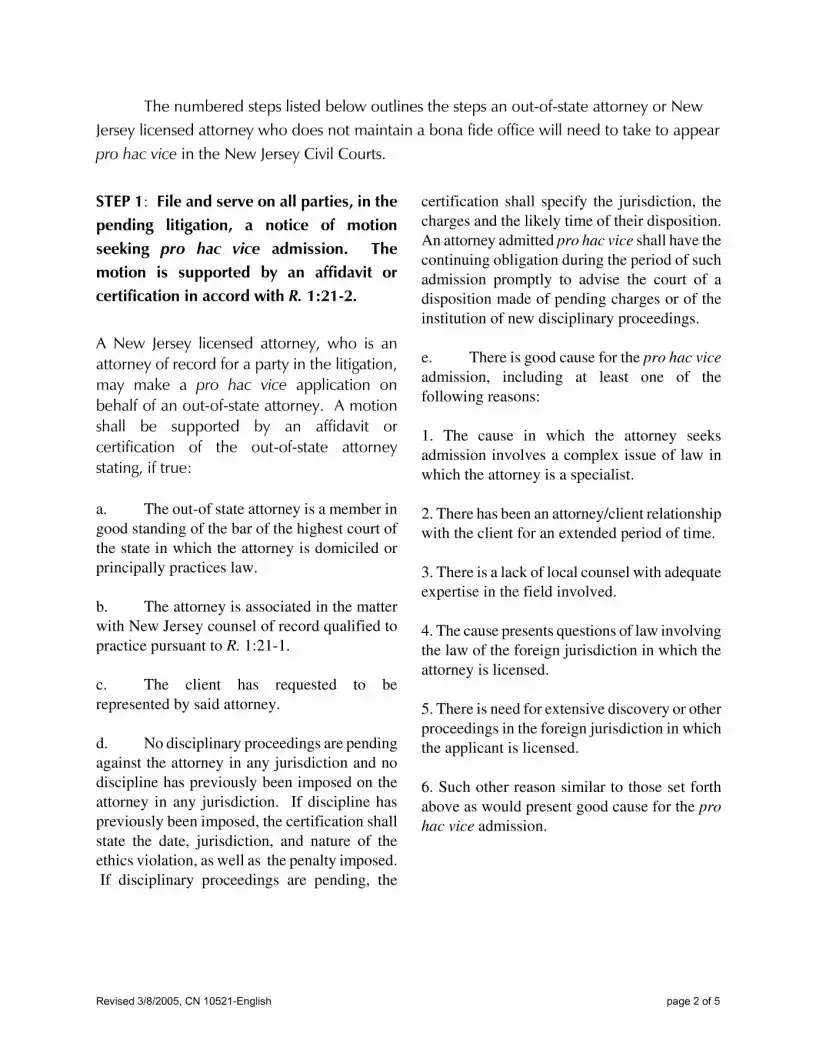
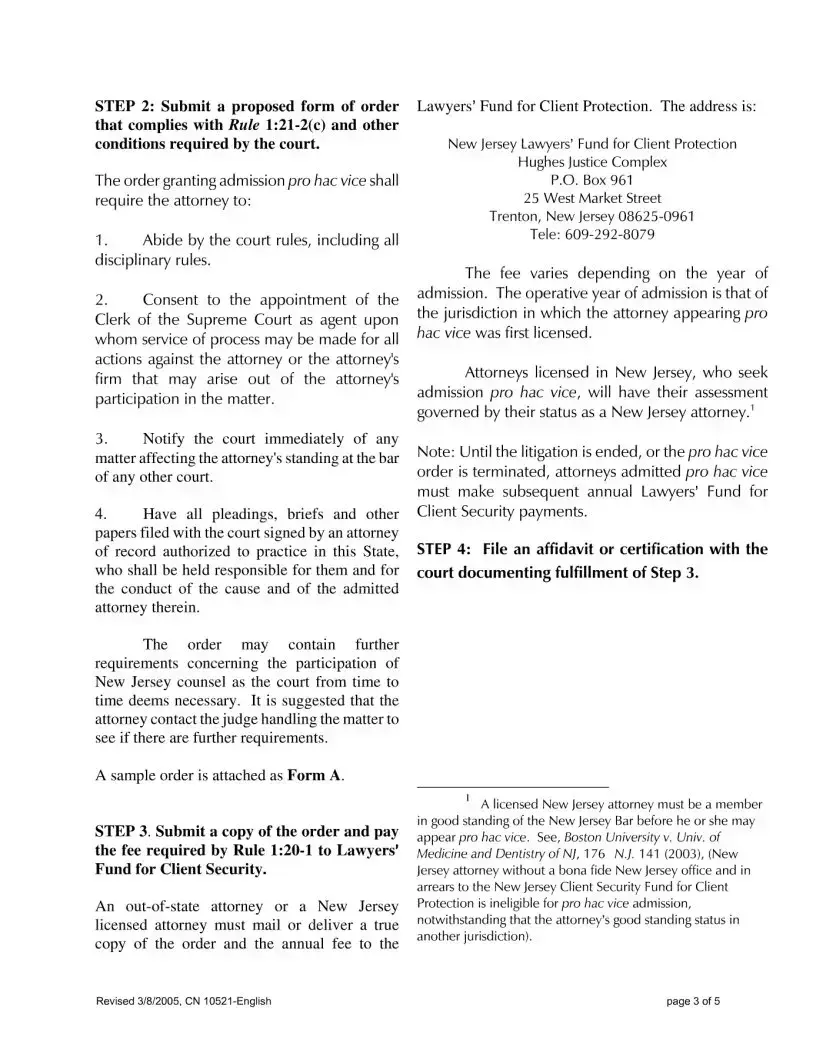
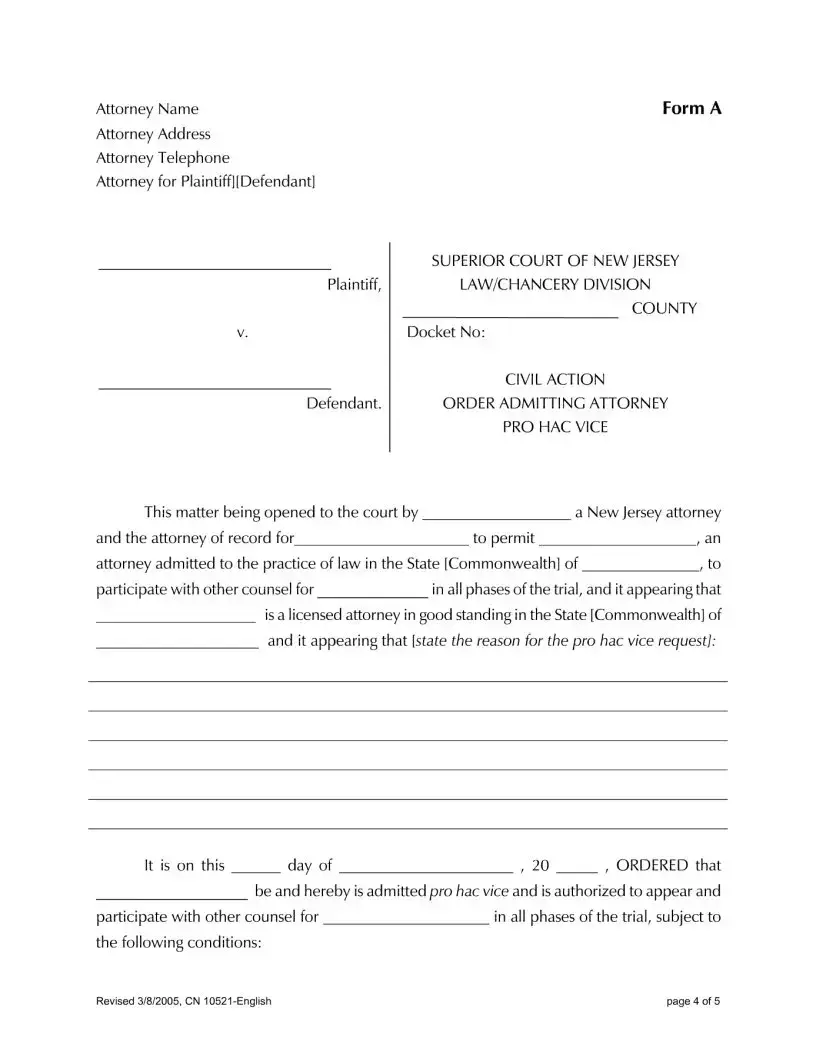
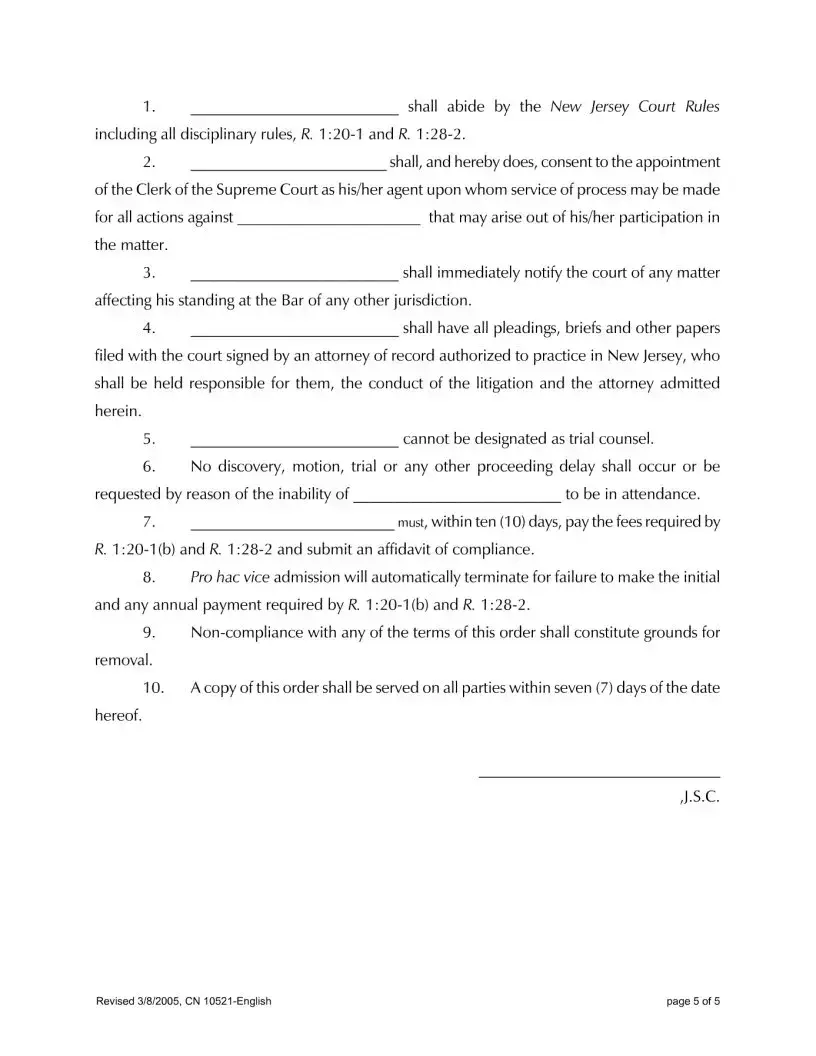
Document Specifications
| Fact Name | Description |
|---|---|
| Purpose | Used for delegating authority in various capacities within the state of New Jersey. |
| Common Usage | Typically utilized in legal, financial, and healthcare decisions. |
| State Specific | Yes, designed specifically for New Jersey, adhering to its laws and regulations. |
| Governing Law(s) | New Jersey statutes covering power of attorney and related delegations of authority. |
| Accessibility | Accessible from state legal resources, legal aid services, and through legal practitioners in New Jersey. |
| Form Validity | Valid upon completion, signing, and, in some cases, notarization, as per New Jersey law. |
| Key Components | Personal details of the principal and agent, scope of authority granted, and any limitations. |
| Necessity for Notarization | Some forms may require notarization to be recognized as legally binding under New Jersey law. |
| Revocation | Can be revoked by the principal at any time, as long as they are mentally competent, or by operation of law. |
Detailed Steps for Using Nj Pro Vice
After deciding to take legal action or when involved in a case before the courts of New Jersey, you may find it necessary to complete the NJ Pro Vice form. This document is essential for attorneys not licensed in New Jersey but who wish to represent a client in a New Jersey court, typically on a single case basis. Accurately and completely filling out this form is critical for ensuring that the process proceeds smoothly and without unnecessary delays. Here are the step-by-step instructions for completing the NJ Pro Vice form, making sure to pay attention to detail and double-checking information for accuracy.
- Start by providing the name of the attorney seeking admission pro hac vice in the space provided.
- Enter the complete address of the attorney, including street address, city, state, and zip code.
- Specify the attorney's phone number and email address for official communications.
- Fill in the name of the court where you seek to practice pro hac vice in New Jersey.
- Enter the case name and docket number associated with the matter for which you're seeking admittance.
- Provide detailed information on your current standing in your home state's bar or licensing authority, including any pending disciplinary actions.
- List any previous applications for pro hac vice in New Jersey or any other jurisdiction, including the outcomes.
- Attach certification from your home state's bar association confirming your good standing.
- If applicable, include details of a New Jersey attorney who will be associated with your representation of the case.
- Ensure all supporting documents, as required by the New Jersey courts, are attached to your application.
- Review the form and attached documents for completeness and accuracy before submission.
- Sign and date the form in the designated sections.
- Follow specific submission guidelines set by the New Jersey court where you are seeking admission, which may include mailing addresses or electronic submission protocols.
Once you've submitted the NJ Pro Vice form along with the required attachments, the next steps generally involve waiting for a response from the court. This can take some time, depending on the court's current workload and the specifics of your application. It's not uncommon for there to be a review period, where further information or clarification could be requested. Keeping a copy of all documents submitted for your records and monitoring your contact information for any correspondence from the court is advisable. Successfully completing and submitting the form is crucial in moving forward with your legal representation in New Jersey.
Learn More on Nj Pro Vice
What is the NJ Pro Vice form?
The NJ Pro Vice form is a document used by attorneys who are not licensed in New Jersey but wish to appear in a New Jersey court on a specific case. This form requests permission from the court for such an appearance.
Who needs to fill out the NJ Pro Vice form?
Any attorney who is not licensed to practice law in New Jersey but wants to represent a client in a New Jersey court must fill out this form. It's essential for attorneys who are licensed in other states or countries and require temporary admission to a New Jersey court.
What information do I need to provide in the NJ Pro Vice form?
You will need to provide:
- Your personal information, including name, address, and contact details.
- The details of your law practice, including your state of licensure and bar number.
- Information about the case and court in which you wish to appear.
- A certification from your home jurisdiction indicating you are in good standing.
- Any other relevant supporting documents.
How do I submit the NJ Pro Vice form?
After completing the form, you must submit it to the New Jersey court where you wish to appear. Submission procedures can vary, so it's critical to check with the specific court's clerk for detailed instructions. Generally, the form can be submitted by mail or electronically, if the court allows.
Is there a fee to submit the NJ Pro Vice form?
Yes, there is a fee associated with submitting the NJ Pro Vice form. The amount can vary depending on the court. You should verify the exact fee with the court where you are applying to appear.
How long does the approval process take after submitting the NJ Pro Vice form?
The approval process can vary from one court to another. It generally takes a few weeks, but it can be longer depending on the court's workload and the completeness of your application. Ensure all sections of the form are filled out accurately to avoid delays.
Can I use the NJ Pro Vice form to appear in multiple cases in New Jersey?
No, the NJ Pro Vice form is case-specific. You must submit a separate form for each case in which you wish to appear. Remember, this form is meant for attorneys seeking temporary, rather than ongoing, admission to practice in New Jersey courts.
Common mistakes
Filing the NJ Pro Vice form, a prerequisite for lawyers seeking permission to practice in New Jersey on a case-by-case basis, involves a detailed process. Applicants often encounter pitfalls that could delay or obstruct their application. Recognizing these mistakes early can significantly streamline the process, ensuring a smoother, more favorable outcome.
Not verifying eligibility before application - Candidates must meet specific requirements to be eligible for pro hac vice admission in New Jersey. Failing to confirm these qualifications beforehand can lead to unnecessary errors and rejections.
Incorrectly filling personal information - It sounds simple, yet it's common. Misspellings, incorrect addresses, or outdated contact information can cause significant delays in the application process.
Omitting the sponsoring attorney's information - A licensed New Jersey attorney must sponsor the applicant. Neglecting to include the sponsor's details, or providing incomplete information, can invalidate the application.
Forgetting to attach required documents - Each application must be accompanied by specific documents, such as a certificate of good standing from the applicant's home jurisdiction. Missing documents can halt the process.
Submitting outdated forms - Using an outdated version of the form can lead to an immediate rejection. It's imperative to use the most current form available on the New Jersey Courts' website.
Incorrect fee payment - Whether it's paying the wrong amount or failing to include the fee entirely, issues with the application fee are a common mistake that can easily be avoided by double-checking the current fee requirements.
Failure to disclose disciplinary history accurately - An applicant must disclose any disciplinary actions taken against them in any jurisdiction. Inaccurate disclosure can lead to serious consequences, including denial of the application.
Overlooking the need for original signatures - Electronic signatures are not accepted on the NJ Pro Vice form. Applicants must provide original signatures, both theirs and their New Jersey sponsor's, to complete the application successfully.
To mitigate these errors, applicants are strongly encouraged to review their application materials carefully, consult the most recent guidelines provided by the New Jersey Courts, and, if necessary, seek guidance from their sponsoring attorney or other legal professionals experienced with the pro hac vice admission process in New Jersey.
Documents used along the form
Completing legal paperwork can sometimes feel like navigating through a maze, especially when dealing with court processes. One such form commonly encountered in New Jersey is the Pro Hac Vice form, utilized by out-of-state attorneys seeking permission to appear in a New Jersey court for a particular case. This is but the tip of the iceberg, as often, several other forms and documents accompany the Pro Hac Vice application to ensure a smooth and compliant legal process. Let's explore some of these critical documents often submitted along with the Pro Hac Vice form.
- Certificate of Good Standing: This document serves as proof that the attorney applying for Pro Hac Vice status is currently a member in good standing of another state's bar. It's an essential document that demonstrates the attorney's credibility and eligibility to practice law elsewhere.
- Motion for Admission Pro Hac Vice: While the Pro Hac Vice form is a request, the Motion for Admission is the formal application an attorney files with the court, asking for permission to practice in New Jersey for a specific case. This document often details the attorney's qualifications and the reasons for their request.
- Order Granting Motion for Admission Pro Hac Vice: After the court reviews the motion and the accompanying documents, it may issue an order granting the motion. This document officially allows the out-of-state attorney to represent their client in the New Jersey court for the specified matter.
- Attorney Registration Form: Even though they're from out of state, attorneys granted Pro Hac Vice status in New Jersey must typically register with the New Jersey Courts. This registration ensures they are recognized as legal practitioners in the state for the duration of their case.
- Verification of Discipline: The applicants might also need to provide a document stating whether they have ever been disciplined by the bar in any jurisdiction. This verification ensures transparency and informs the court of the attorney's disciplinary history, if any.
- Submission of Fee: Last but certainly not least is the submission of the required fee. Alongside the Pro Hac Vice form and other documents, a fee is often necessary to process the application. This fee varies depending on the jurisdiction and the specific requirements of the court.
In the world of legal documentation, understanding the interconnectivity of various forms and their purposes is crucial. For attorneys navigating out-of-state representation in New Jersey, assembling the correct bundle of accompanying documents with the Pro Hac Vice form is a step towards ensuring their plea is heard correctly and efficiently. Such diligence not only demonstrates respect for procedural requirements but also significantly aids in the smooth progression of legal matters for their clients.
Similar forms
Similar to the New Jersey Pro Hac Vice form, the Motion for Admission Pro Hac Vice found in other states allows attorneys not licensed in a specific jurisdiction to represent a client in that jurisdiction for a particular case. This document shares the core requirement of providing detailed information about the attorney's qualifications, good standing in their home state, and the reasons for their request to practice in an out-of-state jurisdiction on a temporary basis. Both forms are critical in ensuring that the attorney meets the specific jurisdiction's standards to protect the interests of the client.
The Application for Temporary Admission before a specific Federal Court mirrors the NJ Pro Hac Vice form in its function and necessity. This document is used when an attorney seeks to practice in a federal jurisdiction where they are not permanently licensed. Similar to the NJ form, it requires the attorney to furnish information regarding their competency, licensing status in other jurisdictions, and the case they wish to represent. Both documents serve the purpose of safeguarding the legal process by ensuring only qualified professionals are granted temporary admission to practice.
The Certificate of Good Standing is another document closely related to the NJ Pro Hac Vice form. While the Certificate of Good Standing is more of a verification document issued by a state bar or court, confirming that an attorney is of good moral character and in good standing in that jurisdiction, it is often a prerequisite for Pro Hac Vice applications. The need for this document underlines the insistence on maintaining high ethical and professional standards in the legal profession, which is a common theme shared with the NJ Pro Hac Vice form.
The Multijurisdictional Practice (MJP) Application is used by attorneys seeking to practice law in a jurisdiction where they are not licensed, which closely resembles the intention behind the NJ Pro Hac Vice form. The MJP Application might cover broader circumstances, including temporary or limited legal services, but like the Pro Hac Vice form, it focuses on the lawyer’s qualifications and the protection of clients' interests. Both documents facilitate the mobility of legal professionals while ensuring the integrity of legal representation.
The Limited Liability Partnership (LLP) Registration for Law Firms often complements documents like the Pro Hac Vice form. Although primarily for firms rather than individual attorneys, the LLP Registration ensures that entities offering legal services meet the jurisdiction’s operational and ethical requirements. This registration, alongside the Pro Hac Vice form, ensures both individual lawyers and legal firms adhere to local regulations, protecting the public and legal system integrity.
The Application for CLE (Continuing Legal Education) Waiver or Extension sometimes works in tandem with the NJ Pro Hac Vice form. Attorneys may need to seek waivers for CLE requirements when applying for Pro Hac Vice admission if they come from jurisdictions with different educational mandates. Both documents underscore the importance of current legal knowledge and competency in providing legal representation, ensuring attorneys stay updated with the law and practice standards.
The Foreign Legal Consultant (FLC) Application shares similarities with the NJ Pro Hac Vice form in terms of allowing legal professionals to practice in jurisdictions where they are not fully licensed. However, the FLC Application caters specifically to attorneys from foreign countries desiring to offer legal advice on the law of their home countries within another jurisdiction. Both documents facilitate cross-border legal practice under specific conditions, aiming to broaden legal services availability while ensuring practitioners meet local standards.
Dos and Don'ts
When you're filling out the New Jersey Pro Hac Vice form, a process allowing a lawyer who is not licensed to practice in New Jersey to represent a client in a specific case, accuracy and thoroughness are key. Here are essential dos and don'ts to help guide you through the process seamlessly.
- Do verify your eligibility before starting the application process. Ensure that you meet all the requirements for pro hac vice admission in New Jersey, including being in good standing in your own jurisdiction.
- Don’t overlook the requirement for a local attorney. New Jersey requires that attorneys applying for pro hac vice status work with an attorney who is licensed in New Jersey and who must be actively involved in the case.
- Do be meticulous with your paperwork. Complete all sections of the form with accurate and current information. Any mistake or oversight can cause delays or result in denial of your application.
- Don’t forget to include the required fee. Check the current fee for a pro hac vice application in New Jersey and ensure you include this with your submission. Fees are subject to change, so verify the current amount beforehand.
- Do provide a detailed legal history. Be prepared to disclose any disciplinary actions taken against you in other jurisdictions. Transparency in this area is mandatory and reflects on your professional integrity.
- Don’t use obsolete forms. Make sure you're using the most current version of the New Jersey Pro Hac Vice form. Using an outdated form can lead to rejection of your application.
- Do attach a certificate of good standing from your home jurisdiction. This document is a critical part of your application, demonstrating that you are eligible to practice law in your home state or country.
- Don’t procrastinate. Submit your Pro Hac Vice application well in advance of when you need to be admitted. The approval process can take time, and waiting until the last minute can jeopardize your ability to represent your client effectively.
Adheriing to these guidelines helps streamline the pro hac vice admission process in New Jersey, ensuring that you can focus on providing the best possible representation for your client without administrative hurdles. Remember, attention to detail and timely preparation make all the difference.
Misconceptions
It's the same across all states: Each state has its own rules for admitting out-of-state lawyers on a pro hac vice basis. New Jersey's requirements can differ significantly from those of other states.
Approval is automatically granted: In New Jersey, an attorney must apply for pro hac vice admission and meet specific criteria. The admission is not guaranteed and requires approval by the court.
No local counsel is needed: New Jersey requires out-of-state attorneys to associate with local counsel who is actively involved in the case.
There's a limit to the number of cases: New Jersey does not impose a strict limit on the number of cases for which an attorney can be admitted pro hac vice. However, repeated applications could be scrutinized more closely.
The application process is lengthy and complicated: While thorough, New Jersey's pro hac vice application process is streamlined to ensure qualified attorneys can participate in court proceedings without undue delay.
It allows permanent practice in NJ: Being admitted on a pro hac vice basis is a temporary permission for a specific case only. It does not grant the right to practice law generally in New Jersey.
Only required for court appearances: The requirement to be admitted pro hac vice extends beyond courtroom appearances to other forms of legal practice in connection with a case, including depositions and arbitrations.
Fees are prohibitive: While there are fees associated with applying for pro hac vice admission in New Jersey, they are not typically prohibitive and are a standard part of the application process.
Any attorney can be approved: Applicants must be in good standing in their home state and not subject to significant disciplinary action to be considered for pro hac vice admission in New Jersey.
It's a one-time process for all future cases: Each new case requires its own pro hac vice application and approval in New Jersey, even if the attorney has been approved previously.
Key takeaways
When navigating the complexities of legal proceedings within New Jersey, understanding the particulars of the NJ Pro Hac Vice form proves essential for attorneys seeking to practice in the state on a temporary basis. The NJ Pro Hac Vice form facilitates the process by which out-of-state attorneys can participate in specific cases within New Jersey courts, ensuring compliance with local rules and promoting a seamless integration into the legal landscape. Here are nine key takeaways to guide you through filling out and using the NJ Pro Hac Vice form:
- Understand the eligibility criteria: Before embarking on the completion of the NJ Pro Hac Vice form, it's important to ensure that one meets the eligibility requirements set forth by the New Jersey courts. These criteria often encompass having an active and good standing bar membership in another state or jurisdiction.
- Accurately complete all sections: To avoid processing delays or outright rejection, every section of the form should be meticulously filled out, providing accurate and up-to-date information regarding personal details, professional background, and the specific case for which Pro Hac Vice admission is sought.
- Include necessary documentation: Submission of the form typically requires accompanying documentation. This may include certificates of good standing from other jurisdictions where the attorney is admitted to practice, as well as any other documents requested by the specific New Jersey court or judge overseeing the case.
- Payment of fees: The NJ Pro Hac Vice admission process involves the payment of a fee, the amount of which can vary. It's essential to verify the current fee, ensure that the payment is made promptly, and include proof of payment with the submission.
- Sponsorship by a New Jersey attorney: One of the unique aspects of the NJ Pro Hac Vice procedure is the requirement for sponsorship by an attorney who is actively licensed and in good standing in New Jersey. This sponsorship must be evident in the application, underscoring the collaborative nature of Pro Hac Vice admissions.
- Adhere to New Jersey's Professional Conduct Rules: Applicants must commit to adherance to New Jersey's Rules of Professional Conduct, highlighting the expectation for out-of-state attorneys to practice with the same level of integrity and professionalism as their New Jersey-licensed counterparts.
- Notification of the local court: It's important to notify the court where the case is being heard about the application for Pro Hac Vice admission. This notification should be done in accordance with the court's specific procedures and timelines.
- Limited scope of practice: Attorneys admitted on a Pro Hac Vice basis are reminded that their permission to practice in New Jersey is limited to the particular case for which they are approved. They are not granted general admission to the New Jersey Bar and must not represent otherwise.
- Maintaining records: Finally, maintaining comprehensive records of the Pro Hac Vice application, approval, and related correspondence is crucial for addressing any future inquiries or requirements from the New Jersey courts or any other involved parties.
By meticulously adhering to these guidelines and carefully preparing the NJ Pro Hac Vice form and related submissions, attorneys can ensure a smooth and efficient process for gaining temporary admission to practice law in specific New Jersey cases, facilitating justice and upholding the high standards of the legal profession within the state.
Popular PDF Documents
New Jersey Boiler License Renewal - Required for the renewal process are a completed application form, a passport size photo, a separate page with the applicant's signature, and the renewal fee payable to the "Commissioner of LWD".
How to Get a Police Report Nj - Ensures companies know the form’s submission address, maintaining a streamlined process for compliance.